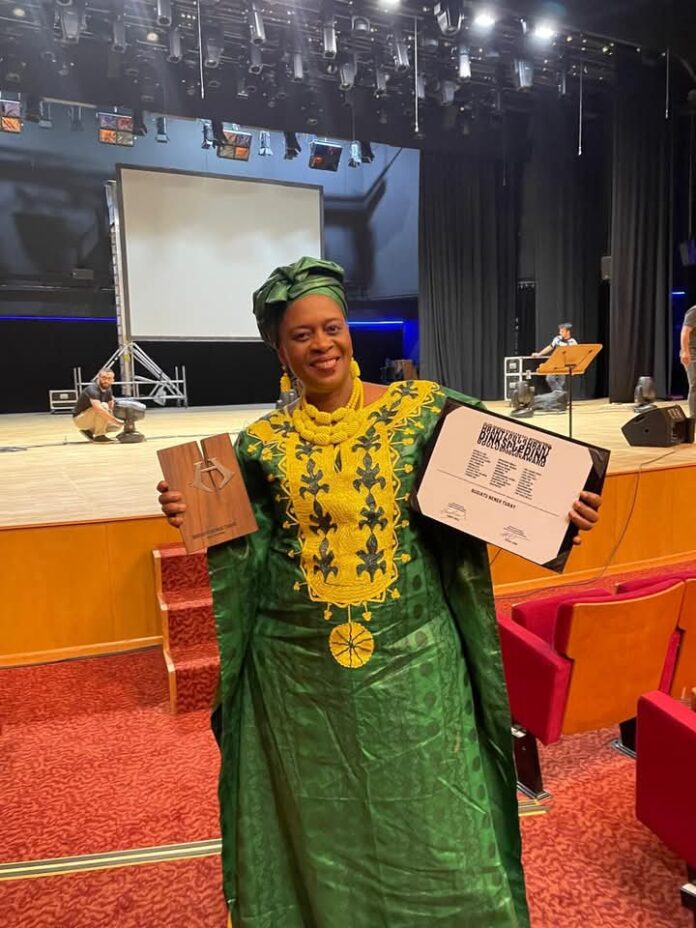Authored by: Marion Precious George
At an age when most girls are dreaming of school and play, Rugiatu Neneh Turay was held down in a dimly lit hut, her body violated in the name of tradition. As blood soaked the earth beneath her, she made a silent vow: No girl would endure this pain if she could stop it. Today, that childhood promise has become a revolution. From survivor to savior, Rugiatu now stands as Sierra Leone’s most fearless defender of women and girls battling the scourge of female genital mutilation (FGM) with a rare blend of unshakable courage and radical empathy. In a nation where 86% of women bear the scars of this brutal practice, her fight is rewriting destinies: one rescued child, one reformed cutter, and one shattered taboo at a time.
Why Rugiatu Neneh Turay’s Story Different?
At just nine years old, Rugiatu Neneh Turay was dragged into the sacred Bondo bush in Sierra Leone’s Kono District, where the village women held her down. What followed was a brutal rite of passage: the crude removal of her external genitalia with an unsterilized knife, no anesthesia, and only crushed herbs to dull the pain. For seven days, she bled uncontrollably. Infection set in. The fever dreams came next. “I prayed for death,” she recalls, her voice steady despite the horror of the memory. “But God had other plans.”
Today, that same woman stands as one of Africa’s most formidable opponents of female genital mutilation (FGM). As founder of the Amazonian Initiative Movement (AIM-SL), Rugiatu has turned her childhood trauma into a nationwide crusade, sparing over 3,000 girls from the blade through a revolutionary blend of cultural sensitivity, economic empowerment, and unshakable courage.
In a country where 9 out of 10 women are cut, her mission is as dangerous as it is vital. Armed with education, economic alternatives, and a groundbreaking “bloodless rite”, she’s turning executioners into allies and victims into scholars. From confronting armed Soweis (traditional cutters) to sheltering fleeing girls in Sierra Leone’s first safe house, Rugiatu’s defiance has made her both a hero and a target.

The Cut That Sparked a Revolution
In Sierra Leone, FGM is not merely a tradition it is an institution. The Bondo Society, a secretive women’s initiation group, has practiced genital cutting for generations, considering it essential for marriageability and social acceptance. According to UNICEF, 86% of Sierra Leonean women aged 15-49 have undergone FGM, one of the highest rates in the world. The practice is deeply woven into the fabric of society, enforced by village elders, celebrated in ceremonies, and shrouded in silence.
Rugiatu’s own suffering was compounded by loss. Her cousin, subjected to the same ritual, died from tetanus shortly after. “They buried her quietly, as if her death was just part of the process,” she says. For years, Rugiatu believed the lie that FGM was necessary until Sierra Leone’s civil war (1991-2002) exposed its darker truths.
During the conflict, Rugiatu witnessed how FGM was weaponized. Rebel forces abducted girls and subjected them to brutal cuttings as acts of domination. In Freetown, where she fled for safety, she worked as a hospital cleaner and saw the consequences firsthand: teenage brides with fistulas from forced marriages, women hemorrhaging from botched procedures, infants struggling to pass through mutilated birth canals. “The hospital was my education,” she says. “I realized FGM wasn’t just a ritual it was the first link in a chain of oppression.”
After surviving Sierra Leone’s brutal civil war (1991–2002), where sexual violence against women was rampant, Rugiatu became determined to fight for gender justice. She recognized that FGM, child marriage, and lack of education kept women trapped in cycles of poverty and abuse.
By 2007, she had saved enough money from selling soap to rent a tiny office in Freetown’s slums. There, with two other survivors, she launched AIM-SL. Their mission was radical: to end FGM not by attacking culture, but by transforming it.
Rugiatu’s strategy was as ingenious as it was risky. Instead of condemning the Bondo Society, she engaged its leaders. She sat with Soweis (traditional cutters) in palaver huts, showing them anatomical diagrams of the clitoris and explaining how its removal caused the complications they saw chronic infections, infertility, even death. “Many had no idea,” she says. “They thought they were purifying girls, not harming them.”
The Nyehnyeh Gbanabom, or “Bloodless Initiation.” This alternative rite preserved all the cultural elements the forest retreat, the dances, the teachings but replaced cutting with a symbolic dot of red clay on the inner thigh. At first, elders mocked it. But when prominent families in Port Loko District publicly embraced the ritual, the tide began to turn. Today, 43 villages have abandoned the blade in favor of Rugiatu’s method.
AIM-SL’s safe house in Lunsar shelters girls who escaped FGM. Among them is 10-year-old, Ellen who felt the social pressure to join after seeing her peers flaunting new clothes, shoes, and accessories perks of initiation.
Recounting her experience, Ellen revealed that her mother, a Sowei (traditional FGM practitioner), never wanted her to undergo the harmful practice. However, her grandmother insisted on initiating her into the Bondo Society, a secret women’s society associated with FGM in Sierra Leone.
Unaware of the severe consequences of FGM, she was tempted. However, after overhearing a conversation between her mother and grandmother about the dangers of the “cutting” aspect, she became fearful and decided against it.
Ellen’s turning point came when a friend’s mother took her to AIM, where she was sheltered in one of the organization’s safe homes in Lunsar. This refuge not only protected her from FGM but also provided her with continuous educational support.
Ellen, who is now a student at Milton Margai Technical University, owes her life and academic success to the intervention of AIM (Advocacy Movement against FGM). Rescued from the threat of Female Genital Mutilation (FGM) as a child, she has since been supported by the organization throughout her education from primary school to university.
Today, Ellen proudly participates in Alternative Rites of Passage (Bloodless Bondo), a cultural practice that preserves tradition without the physical and psychological harm of FGM. She eventually joined the Bondo Society as she had always wished but without undergoing FGM, sparing her from the deadly complications that have claimed the lives of many girls.
Ellen’s story is a testament to the power of education, awareness, and intervention. Thanks to AIM, she escaped a dangerous tradition and is now pursuing higher education, inspiring others to choose a safer, healthier path.
A Reward For a Courageous Fighter
Rugiatut’s courage has drawn global attention. A 2020 BBC documentary showcased her work, and awards like the Front Line Defenders Prize line her modest office. But Rugiatu measures success in quieter victories the former Sowei who now farms cassava instead of cutting girls, the village chief who publicly renounces FGM, the mothers who break the cycle for their daughters.
Heroes are not just those who wear capes they are ordinary people who stand up against injustice despite the risks. Rugiatu Neneh Turay’s unwavering fight against FGM and for girls’ education makes her a true modern-day hero. Through her work, thousands of girls now have a chance at a safer, brighter future.




